- Home
- Neal Shusterman
Everlost s-1 Page 4
Everlost s-1 Read online
Page 4
“You should try to remember that the living only have thirty-two teeth.”
He looked at her, stunned by her directness.
“Eight incisors,” Mary continued, “four canine, eight bicuspids, and twelve molars, if you’ve got wisdom teeth.”
“Oh,” he said, getting red in the face.
“It’s clear you put a lot of importance on your smile, but when you think about it too much, it starts to take over.”
Even before he turned to leave, Mary could see the information taking effect; his mouth was shrinking back to sensible proportions.
In her book Spectral Visions: An Afterlight’s Guide to Looking One’s Best, Mary Hightower writes, “If, at times, you find others looking at you strangely, and you don’t know why, chances are you’re losing touch with your own self-image.
That is to say, your body, or your face, is beginning to distort. Remember, we look the way we look only because we remember looking like that. If you forget that your eyes are blue, they may just turn purple. If you forget that human beings have ten fingers, you may suddenly end up with twelve.
A simple remedy to image-loss is to find a picture that you think resembles you – and if you happened to have crossed over with an actual picture of yourself, all the better. Study the picture. Take in as much detail as you can. Once the image is firmly in your mind, you’ll start looking like your old self in no time. Never underestimate the importance of remembering how you looked in life.
Unless, of course, you’d rather forget.”
CHAPTER 6
Scavengers
Nick remembered everything about his life in perfect detail. How he looked, how his parents looked, what he had for lunch before the miserable accident that landed him here. It troubled him, though, that Lief had become such a blank slate over the years he had been in his forest. If memories aged badly, fading like an old newspaper, how long until Nick suffered the same loss? He didn’t want to forget anything.
Having been used to travel at sixty-five miles per hour, Nick’s southbound trek with Allie was a slow one. Hiking was not one of Nick’s favorite activities. In life it would make his joints ache, and he would invariably stumble on some rude protrusion of nature, and skin a knee. This hike-after-death was no more pleasant. True, the bruises and body aches were gone, but he could not deny how thirsty it made him. Thirsty and hungry. Lief had told them that they no longer needed to eat or drink, anymore than they needed to breathe, but it still didn’t stop the craving. “You get used to it,” Lief had told them, back in the forest.
Nick wasn’t sure he ever wanted to get used to an eternity of longing.
They also discovered their spectral bodies didn’t actually require sleep, but, as with food, it didn’t change the craving for it. Nick and Allie had agreed that they would take time to sleep, as they would have if they were still alive.
It was a connection to the world of the living that they did not want to lose.
The simple act of resting, however, couldn’t be done just anywhere.
“How can we sleep if we sink?” Nick had asked on the first evening. The road-shoes they wore did their job while Nick and Allie walked, keeping them mostly on the surface of the road, but if they stood still for too long, the ground began its slow swallow. They couldn’t find a way to keep from sinking that first night, and so they kept walking.
It was on the second day of their journey that the solution came. When the mountain road became treacherous, they began to find odd little patches of asphalt that weren’t like the rest of the road. They were solid! The patches were never more than a few feet wide. It was Allie who figured it out when they came across one that was marked with a small white wooden cross.
“I know what this is!” Allie said. “I saw them when we visited Mexico. They put little crosses by the side of the road where people died in car accidents. I never thought to look for it here in the States, but I’ll bet there are people who do it here, too.”
“So the passing of a spirit must leave a permanent mark on the spot where it happened, turning it into a dead-spot!” Nick had to admit it was an exciting, if somewhat morbid discovery.
They rested on one of the so-called dead-spots, close together, because the spot was so small, and as they basked in the light of their own glows, they allowed themselves the luxury of small talk. They discussed all those subjects that didn’t matter much in the larger scheme of things, like what music they liked, and who they thought won the World Series during their nine-month transition.
Their conversation took a sober turn, as late night conversations often do.
“When I get home,” Allie said, “I’m going to find a way to make them all see me.”
“But what if they never see you?” Nick said. “What if they just keep on living their lives like you’re not even there?”
“That’s not gonna happen.”
“Why not?” said Nick. “Because you say so? That’s not how the world works.”
“How do you know? You don’t know how this world works any more than I do.”
“Exactly. That’s why I say we learn more about it before we go home. We’ve got to find other ghosts with more experience.”
“Other Afterlights,” Allie corrected, still refusing to admit she was a ghost.
The thought made Nick look at his hands and arms, studying his own peculiar incandescence; his gentle Afterlight glow. The lines that ran across his palms were still there. He could see his fingerprints—but perhaps that was just because fingerprints are what he expected to see. He wondered if he would still look the same if he had made it all the way to the light at the end of the tunnel, or if the memory of flesh would completely dissolve into the glow once he reached his final destination—a destination where his family might already be.
“We have to accept that there may be nobody to go home to,” Nick reminded Allie.
Allie pursed her lips. “Maybe for you, but it was just my Dad and me in our car.
Mom stayed home because my sister was sick.”
“Doesn’t it even bother you that your Dad might not have made it?”
“He made it somewhere,” Allie said, “which is more than I can say for us. It’s like Lief said—everyone else in the accident either survived or they got where they were going—which means that either way they’re sort of okay.”
Allie did have a point; it was some comfort to know that there truly was some place they were all ultimately going—that the end wasn’t the end. Even so, the thought of his whole family making that mysterious journey all at the same terrible time…Then something occurred to Nick. “I didn’t see any dead-spots where the accident happened. We got thrown into the forest, but there were no dead-spots on the road!”
“We weren’t looking for dead-spots then,” Allie pointed out, but Nick chose to believe there were none. It was better than the alternative.
“Where were you going that day?” Nick asked.
Allie took her time before she answered him. “I can’t remember. Isn’t that funny?”
“I’m starting to forget things, too,” Nick admitted. “I don’t want to forget their faces.”
“You won’t,” she said—and although there was no evidence to back it up, Nick chose to believe that, too.
***
By the third day, they had passed out of the mountains, and the highway became wider and straighten They were still in Upstate New York, many miles away from their respective destinations. At this rate it would take weeks, maybe months to get there.
They passed town after town, and soon learned how to easily identify dead-spots.
They were different from the living places. First of all, there was a clarity to them—they were in sharper focus, and the colors were far more vibrant. Secondly, when you stood in one of those spots, there was a certain sense of well-being-a sense of belonging—as if the ghost places were the true living places, and not the other way around.
It was that fundamental grayness o
f the living world that struck more deeply than any chill. Although they wouldn’t speak it aloud, it made both Nick and Allie long for the lush and comforting beauty of Lief’s forest.
At dusk, on the fifth day, they found a nice patch of solid ground, beneath a big sign that said, WELCOME TO ROCKLAND COUNTY! Leaves poked through the pavement, lush and green to their eyes, eternally unaffected by the changing of seasons. The spot was large enough for both of them to stretch out and sleep.
“I’m tired of sleeping every night,” Nick said. “We don’t need it. We don’t get tired,” and then he said the real reason why he didn’t want to sleep. “I don’t like not dreaming.”
Allie felt the same way, but didn’t want to say anything about it. Once, many years ago, her appendix had burst, and she had gone under general anesthesia. It was a strange sensation. She started to breathe in the anesthetic, and boom, she was out. Then suddenly she was awake again, and it was all over. There was just a hiccup of time, some groggy confusion, and she was back, with an ache in her side and some stitches. It was like…not existing. Sleep here was the same way.
“We sleep because we can,” she told Nick. “Because it reminds us of what it’s like to be alive.”
“How can eight hours of death remind us of being alive?”
Allie had no answer for him, only that it felt right. It felt natural, and in their unnatural state, anything that felt natural was a good thing. In the end Nick stopped his grumbling, and lay down. “I’ll lie here, but I’m not going to sleep. I’ll stay awake and watch the stars.”
The stars, however, were not sufficiently exciting to keep him awake. In fact, they were sedating. He fell asleep before Allie did, leaving her to ponder their predicament. What if she got home, and her parents weren’t there? What if her father had died in the accident, and her mother had moved away? She wouldn’t be able to ask anyone about it, she’d have no way of finding out. She was thankful when the anesthetic sleep of Everlost finally overtook her.
The ambush came without warning in the middle of the night.
Nick and Allie opened their eyes to four stern, glowing faces looking down on them. In an instant they were grabbed and hauled to their feet, roughed up and manhandled. Allie tried to scream, but a large hand covered her mouth. A hand like that of a monster. Only these weren’t monsters; these were boys no older than she.
“Nick!” she called. But Nick was too busy fighting off two boys who were struggling to hold him as well.
“What’s your problem?” Nick shouted. “Who are you? What do you want? “
“We ask the questions,” said the boy who was apparently in charge. He was smaller than the rest, but clearly the toughest of the lot. He wore baggy knickerbockers, not much different from Lief’s, and from h. is lip dangled a cigarette that never got smaller and never went out. But by far the strangest thing about him was his hands. They were the size of a man’s hands, big and knobby, and when he curled them into fists, they seemed as large as boxing gloves.
“I think they’re Greensouls, Johnnie-O,” said one kid with a weird mop of candy—apple-red hair that made him look like a Raggedy Andy doll. “A week old, maybe less.”
“I can see that,” Johnnie-O said. “I’m not stupid, I know a Greensoul when I see one.”
“We’re Afterlights,” Nick shouted out, “just like you, so leave us alone.”
Johnnie-O laughed. “Of course you’re Afterlights, idiot. What we’re saying is that you’re new arrivals. Greensouls. Get it?”
“They might still got stuff,” said Raggedy Andy. “Greensouls always got stuff.”
“Welcome to Everlost,” Johnnie-O said in a voice that wasn’t welcoming at all.
“This here’s my territory, and you gots to pay me for passage.”
Allie gave the boy holding her a punch in the face to get him to let go. “Is this how you always greet visitors?” Allie said.
Johnnie-O took a suck on his cig. “Visitors ain’t always friendly.”
Nick shrugged off the two boys who were holding him. “We don’t have anything to pay you with.”
“Yeah, so I guess you’ll just have to kill us,” Allie said snidely, and added, “Oh, sorry, guess you can’t.”
“Turn their pockets,” Johnnie-O ordered, and his goons reached into Nick and Allie’s pants pockets and turned them inside out. Mostly they got lint, but Nick had a couple of things he had forgotten were in there. There was that old coin, which must have been a nickel, although the face had worn off. The tough kids weren’t interested in it, and flicked it back at him. He caught it and returned it to his pocket.
It was the other object in Nick’s pocket that got their attention.
“Look at this,” said a funny-looking kid with dark purple lips, like he had died while sucking on a grape jawbreaker. He held up a hard little object that had fallen out of Nick’s pocket, which Nick quickly recognized as a piece of what is commonly referred to as “ABC” gum, wrapped up in its original wrapper. His mother always complained that he left his chewed gum in his pockets and it got all over the clothes in the wash.
The purple-mouthed kid held the hard, cold wad of gum and looked over at Johnnie-O, hesitating.
“Hand it over,” said Johnnie-O. His voice was commanding for a boy of his size.
He opened up his huge, beefy hand.
Still Purple-puss hesitated. “We can cut it into pieces,” he suggested.
“I said hand it over.” Johnnie-O held his upturned palm right before the boy.
You didn’t say no to a palm that big. Purple-puss gingerly put the small, round wad into Johnnie-O’s hand.
“Next time I have to ask you twice,” Johnnie-O said, “you’re going down.”
Purple-puss’s Adam’s apple bobbed nervously, like a walnut in his throat. Or a jawbreaker.
Then Allie and Nick watched in utter disbelief as Johnnie-O peeled the paper from the sticky piece of gum and popped it in his mouth.
“Oh, gross,” said Nick.
In response, Raggedy Andy punched him in the stomach. Nick doubled over out of reflex, only realizing a second later that it didn’t hurt. How annoying it must be for bullies, he thought, to not be able to inflict pain. This place must be a bully’s version of hell.
Johnnie-O worked the gum until it was soft again. He closed his eyes for a moment as he chewed. “A lot of flavor still left in this one,” he said.
“Cinnamon.” Then he looked at Nick. “You always waste your gum like that?” he said. “I mean, when you were living?”
Nick only shrugged. “I chew until I can’t taste it anymore.”
Johnnie-O just kept on chewing. “You ain’t got no tastebuds.”
“Can I have it next?” said Purple-puss.
“Don’t be gross,” Johnnie-O said.
Allie laughed at that, and Johnnie-O threw her a sharp gaze, followed by a second gaze that was more calculated.
“You’re not the prettiest thing, are you?” he said.
Her lips pulled tightly together in anger, and she knew that made her less attractive, which only made her angrier. “I’m pretty enough,” she said. “I’m pretty in my own way.” Which was true. No one had ever called Allie a ravishing beauty, but she knew very well that she wasn’t unattractive, either. What made her madder still was that she had to justify herself and the way she looked to this big-handed creep, who chewed other people’s used gum. “On a scale of one to ten,” Allie said, “I suppose I’m a seven. But you, on the other hand, I estimate you to be about a three.” She could tell that it stung, mainly because it was true.
“Seven’s not worth lookin’ at,” he said. “And the way I see it, we’re not going to have to look at each other much longer, are we?”
“What’s that supposed to mean?” said Nick, who did not like the sound of it any more than Allie did.
Johnnie-O crossed his arms, making his oversized hands seem even larger compared to his small chest. “A single piece of gum don’t buy you passage
over my territory,” he said. He turned to Nick. “Which means you gots to be my servant now.”
“We’ll do no such thing,” said Allie.
“I wasn’t talkin’ to you. We don’t need the likes of you around here.”
“Well,” said Allie, “I’m not going without him.”
And the others laughed.
“Oh,” said Raggedy Andy, “I don’t think he’ll want to go where you’re going.”
Allie didn’t quite know what that meant, but even so, she started to panic.
“Grab her,” Johnnie-O ordered his comrades.
Allie knew she had to think of something quick, and so she said the first thing that came to mind. “Stay away from me or I’ll call the McGill!”
That stopped them dead in their tracks.
“What are you talkin’ about?” said Johnnie-O, not as sure of himself as he was a second ago.
“You heard me!” Allie yelled. “The McGill and I have a special arrangement. It comes when I call it. And I feed it bad little thieves whose hands are bigger than their brains.”
“She’s lying,” said another kid, who hadn’t spoken until now, probably because he had such a nasty, squeaky voice.
Johnnie-O looked all irritated. “Of course she’s lying.” He looked at Allie and then back at the quiet kid. “So how do you know she’s lying?”
“She’s a Greensoul—probably just crossed over,” the squeaky kid said, “which means she hasn’t even seen the McGill.”
“Besides,” said Purple-puss, “no one sees the McGill and lives.”
“Except for her,” said Nick, figuring out his own angle on the situation.
“That’s why I stay with her. As long as I’m with her, the McGill protects me, too.”
“So, what’s it look like?” Johnnie-O said, looking closely at Allie, trying to read the bluff in her face.
“Well, I could tell you,” she said, using one of her father’s favorite lines.
“But then I’d have to kill you.”
The others laughed at that, and so Johnnie-O curled his heavy hand into a fist and smashed the closest kid for laughing. He flew back about five feet. Then Johnnie-O got closer to Allie again.

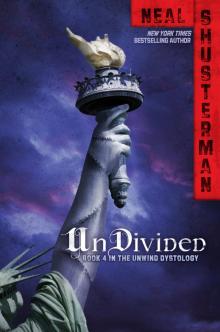 UnDivided
UnDivided UnBound
UnBound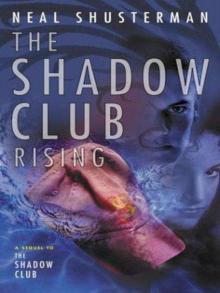 The Shadow Club Rising
The Shadow Club Rising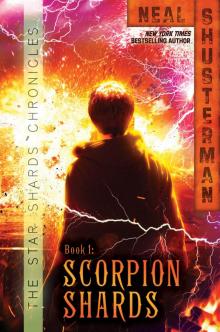 Scorpion Shards
Scorpion Shards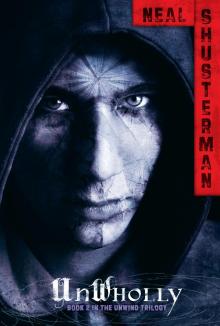 UnWholly
UnWholly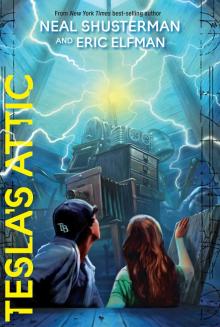 Tesla's Attic
Tesla's Attic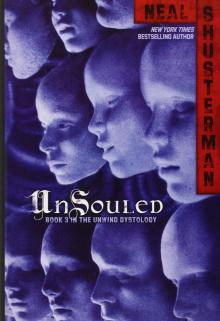 UnSouled
UnSouled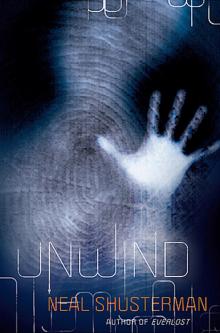 Unwind
Unwind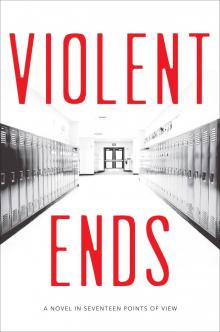 Violent Ends
Violent Ends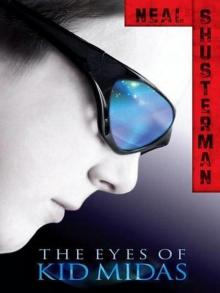 The Eyes of Kid Midas
The Eyes of Kid Midas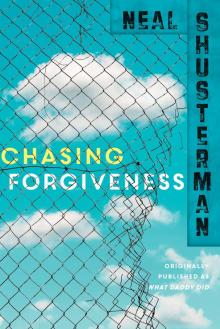 Chasing Forgiveness
Chasing Forgiveness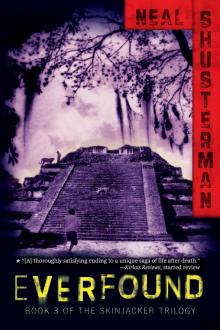 Everfound
Everfound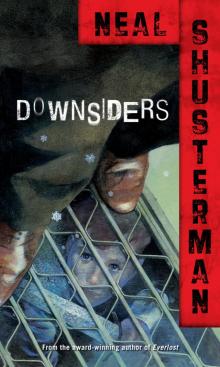 Downsiders
Downsiders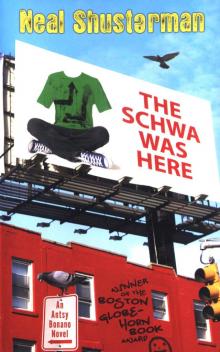 The Schwa Was Here
The Schwa Was Here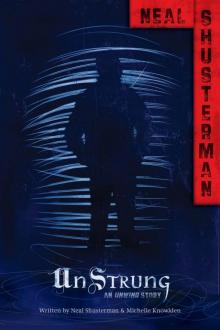 UnStrung
UnStrung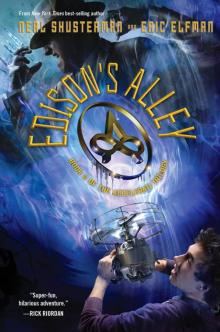 Edison's Alley
Edison's Alley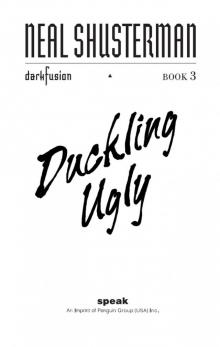 Duckling Ugly
Duckling Ugly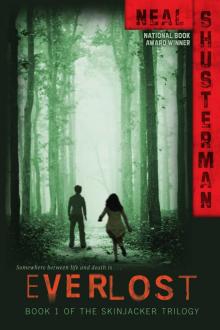 Everlost
Everlost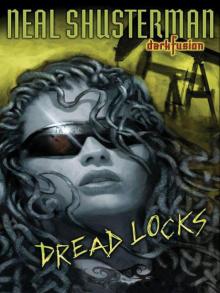 Dread Locks
Dread Locks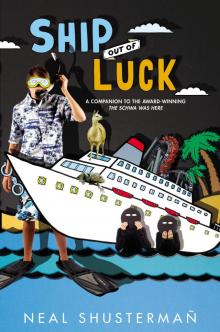 Antsy Floats
Antsy Floats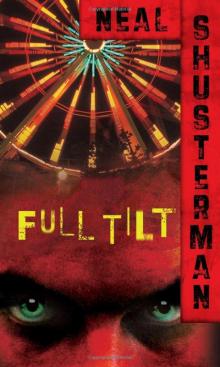 Full Tilt
Full Tilt Thunderhead
Thunderhead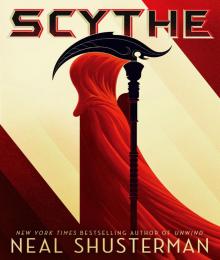 Scythe
Scythe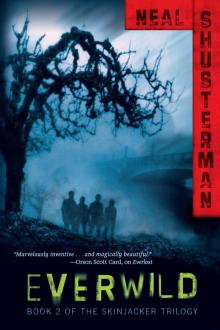 Everwild
Everwild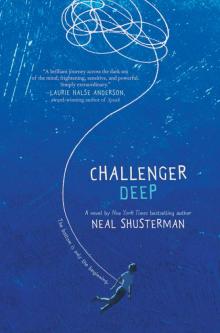 Challenger Deep
Challenger Deep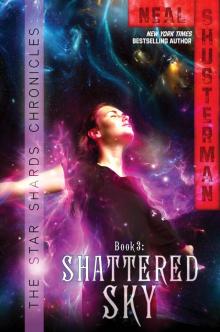 Shattered Sky
Shattered Sky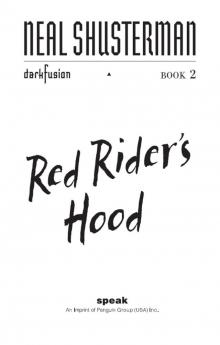 Red Rider's Hood
Red Rider's Hood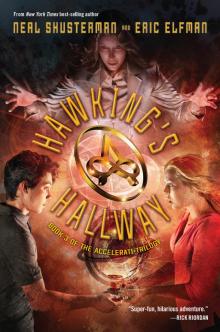 Hawking's Hallway
Hawking's Hallway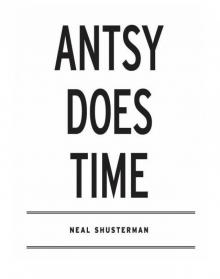 Antsy Does Time
Antsy Does Time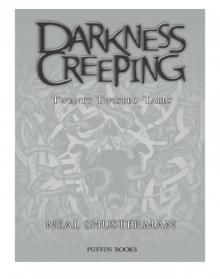 Darkness Creeping: Twenty Twisted Tales
Darkness Creeping: Twenty Twisted Tales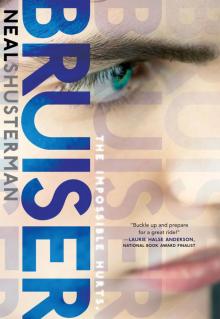 Bruiser
Bruiser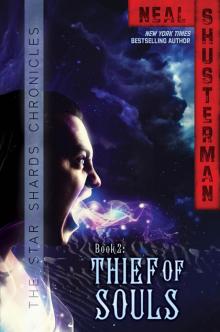 Thief of Souls
Thief of Souls The Toll
The Toll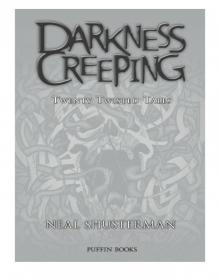 Darkness Creeping
Darkness Creeping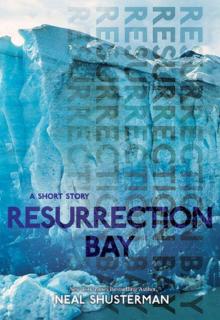 Resurrection Bay
Resurrection Bay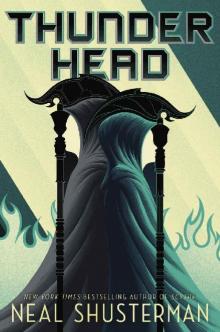 Thunderhead (Arc of a Scythe Book 2)
Thunderhead (Arc of a Scythe Book 2)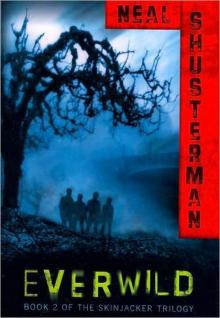 Everwild (The Skinjacker Trilogy)
Everwild (The Skinjacker Trilogy)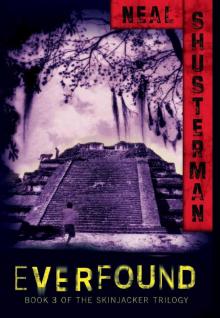 Everfound s-3
Everfound s-3 Edison’s Alley
Edison’s Alley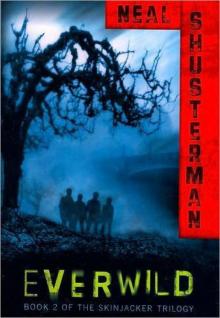 Everwild s-2
Everwild s-2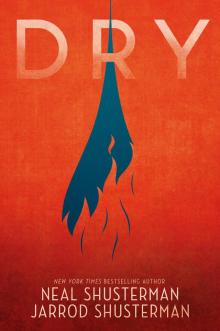 Dry
Dry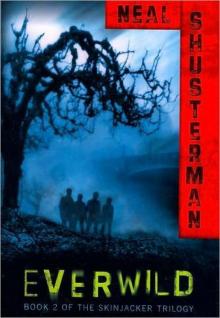 Skinjacker 02 Everwild
Skinjacker 02 Everwild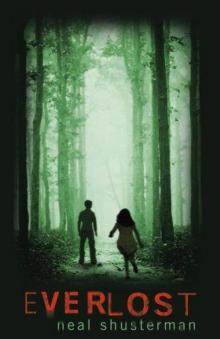 Everlost s-1
Everlost s-1